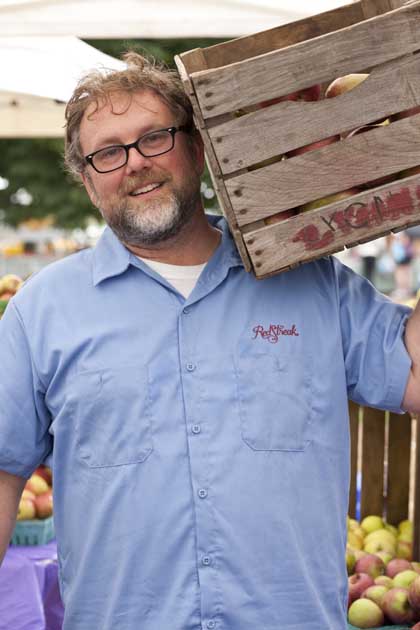Not Your Father’s Hard Cider
Today it gets barrel-aged, Brett-o-mized and sake'd out
Doesn’t Fall Far from the Orchard
When Greg Hall walks into a liquor store in Chicago, he’s accustomed to seeing 150 feet of shelf space for craft beers including the ones he made at Goose Island Brewing, which his dad John started in 1988. “But,” he adds, “they’ve got like four ciders. I can buy 20 different Michigan beers but only one Michigan cider.” There are probably more cideries in Michigan—close to 20—than in any other state. And he can forget about finding something from New Hampshire’s Farnum Hill or Washington’s Snowdrift. Outside of the Upper Midwest, America’s other primary cider regions are New England and the Pacific Northwest. Part of the allure is that ciders appeal to those who seek out local products. “All these great cider makers are local,” says Hall. “They’re regional, or sub-regional.” The only downside is that fans in one part of the country simply don’t have access to ciders from another part.
Lack of variety is something cider fans in Portland need not worry about, once they step inside Bushwhacker. The bar grew out of owner Jeff Smith’s frustration in always “finding mostly dusty bottles” of the hard stuff. He and his wife Erin have three coolers stocked with over 150 bottled ciders—everything available in the state of Oregon including several brands brought in just for the Smiths. It is probably the country’s first and only all-cider bar, akin to the few cider houses in England. It’s popular among expats. A few cans of British ales rest on the bottom shelf, but Smith initially devoted two of his eight draft lines for great suds because he “wasn’t confident enough that everyone would go coo-coo for cider.” Even the beer geeks who got dragged in by “cider geeks who have come out of the closet” have become converts. Now, in the back of the bar behind a chain link fence, Smith puts his years of home cidermaking experience to work in the new licensed cidery picking up a few accounts around town.
Malts and hops’ stability make them easily transportable. Farm fresh apples, not so much. Bruce Wright of Orchard Gate ciders based in Flushing, MI, points out that the USDA disclosed that two-thirds of the apple juice in the US comes from Chinese apple concentrate; no wonder all that Mott’s juice on the shelves is so cheap. And like Orchard Gate’s organically-grown apples, Virtue also sources its fruit mostly from Michigan that is finally seeing acreage return to growing apples after years of serious decline.
So while amazing breweries can and do exist all over, until such time as global climate change brings longer winters to the southern half of the country, don’t look for the cider boom to strike in Arizona or Florida.
Pages:Previous 1 2 3 4 5 6 7 8Next
Brian Yaeger
Brian Yaeger lives in Portland, OR.


I have a little bit of a problem. My boyfriend likes to drink beer but unfortunately I think he’s allergic to it. Every time he drinks it the next day he wakes up with red eyes, stuffed up nose and “worn out” and that happens even only after having 2 beers. And he drinks Coors light so that should tell you something. I think he’s allergic to the hops in beer so I’m telling him to try Cider. But trying to find Ciders that are NOT made with hops seems to be difficult. I know Angry Orchard says it doesn’t use hops, do you know of any more? Any help would be greatly appreciated. Thank you